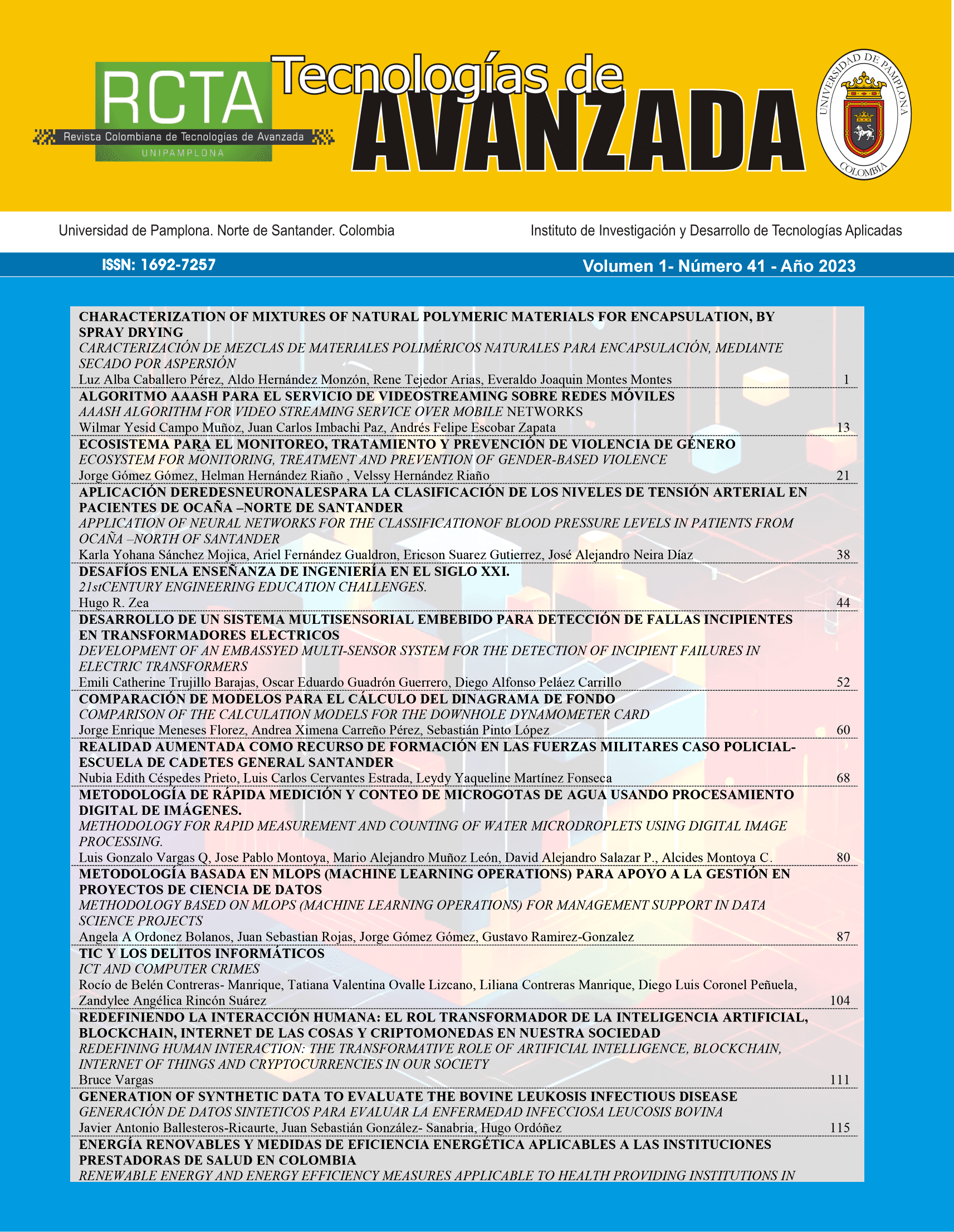RENEWABLE ENERGY AND ENERGY EFFICIENCY MEASURES APPLICABLE TO HEALTH PROVIDING INSTITUTIONS IN COLOMBIA
DOI:
https://doi.org/10.24054/rcta.v1i41.2557Keywords:
Renewable Resources, Energy Efficiency, Energy Savings, SustainabilityAbstract
Nowadays’ global context has increased the demand and use of electrical energy, since most of the tools or machinery used in all market sectors depend on electricity. For this reason, renewable energies have become a key element to guarantee
sustainability, developing fairer societies with equal conditions for all. Health Service Provider Institutions (HSPI) enjoy high energy consumption, so incorporating renewable energy sources is an important opportunity to diversify the energy basket. The objective is to identify the types of renewable energy that can be incorporated into energy efficiency measures in the HSPI of Barranquilla.
Method: The research is descriptive, accompanied by a documentary review. The data collection techniques used were observation and documentary matrices.
Results: Solar energy is considered as an opportunity to provide economic benefits to the IPS with the incorporation of a mixed system with PV solar cells or modules, whose costs are attractive compared to the energy rates of electricity service companies and promote the culture of energy saving.
Conclusions: The massification of the use of renewable energies for use in all sectors and activities of humanity is presented as urgent and the IPS are essential for this task, both at a public and private level, because they should promote development and application of these from the planned investment, guaranteeing their efficient management-
Downloads
References
Andrade-Zambrano, E. E., & Real-Pérez, G. L. (2021). Las PYMES y la eficiencia energética con la ISO 50001. Polo del Conocimiento, 6(6), 674-694. DOI: 10.23857/pc.v6i6.2777
Ballesteros-Ballesteros, V. A., & Gallego-Torres, A. P. (2019). Modelo de educación en energías renovables desde el compromiso público y la actitud energética. Revista Facultad de Ingeniería, 28(52), 27-42. DOI: https://doi.org/10.19053/01211129.v28.n5 2.2019.9652
Barragán-Escandón, E., Zalamea-León, E., Terrados-Cepeda, J., & Vanegas-Peralta, P. (2019). Factores que influyen en la selección de energías renovables en la ciudad. EURE, 45(134), 259-277. DOI: http://dx.doi.org/10.4067/S0250- 71612019000100259
Barrera, M. H. (2019). Fundamentos para la Administración Energética en las Organizaciones. Revista de Gestión Empresarial y Sustentabilidad, 5(1), 1-11. Recuperado de: https://rges.umich.mx/index.php/rges/artic le/view/46/30
Caraballo Pou, M. Á., & García Simón, J. M. (2017). Energías renovables y desarrollo económico. Un análisis para España y las grandes economías europeas. El trimestre económico, 84(335), 571-609. DOI: https://doi.org/10.20430/ete.v84i335.508
Cortés, S., & Londoño, A. A. (2017). Energías renovables en Colombia: una aproximación desde la economía. Revista Ciencias Estratégicas, 25(38), 375-390. Recuperado de: https://www.redalyc.org/pdf/1513/151354 939007.pdf
Galeano-Rendón, E., & Mancera-Rodríguez, N. J. (2018). Efectos de la deforestación sobre la diversidad y la estructura del ensamblaje de macroinvertebrados en cuatro quebradas Andinas en Colombia. Revista de Biología Tropical, 66(4), 1721-1740. DOI: http://dx.doi.org/10.15517/rbt.v66i4.3139 7
García Garnica, J. E., Sepúlveda Mora, S. B., & Ferreira Jaimes, J. (2018). Viabilidad técnico-económica de un sistema fotovoltaico en una planta de tratamiento de agua. INGE CUC, 14(1), 41-51. DOI: http://doi.org/10.17981/ingecuc.14.1.2018
.04
Gil Morales, J. A., Guayán Ardila, I. C., Polania Sánchez, L. H., & Restrepo, H. F. (2019). Análisis situacional de los hospitales verdes colombianos pertenecientes a la red global. Revista de Salud Ambiental, 19(1), 12-22. Recuperado de: https://www.ojs.diffundit.com/index.php/r sa/article/view/918
Gómez, C. G., & Carrasco, F. J. C. (2019). Elección de sistemas de gestión para el mantenimiento, rehabilitación y eficiencia energética de edificios. 3c Empresa: investigación y pensamiento crítico, 8(3), 12-63. DOI: http://dx.doi.org/10.17993/3cemp.2019.08 0339.12-63
Hernández Pasichana, S. M., & Posada Arrubla, A. (2018). Avances de la investigación sobre la gestión integral del recurso hídrico en Colombia. Revista UDCA Actualidad & Divulgación Científica, 21(2), 553-563. DOI:
https://doi.org/10.31910/rudca.v21.n2.201 8.1079
Luna, C., & Hernández, J. (2021). Estado de las condiciones de gestión ambiental en instituciones prestadoras de servicios de salud de nivel II a nivel IV en Cali, Bogotá y Pereira acorde a la normatividad vigente ya la red global de hospitales verdes 2020. Recuperado de: https://repositorio.uniajc.edu.co/handle/un iajc/633.
Martínez-Sierra, D., García-Samper, M., Hernández-Palma, H., & Niebles-Nuñez, W. (2019). Gestión energética en el sector salud en Colombia: un caso de desarrollo limpio y sostenible. Información tecnológica, 30(5), 47-56. DOI: http://dx.doi.org/10.4067/S0718- 07642019000500047
Nogar, A. G., Clementi, L. V., & Decunto, E. V. (2021). Argentina en el contexto de crisis y transición energética. Revista Universitaria de Geografía, 30(1), 107-131. DOI: http://dx.doi.org/https://doi.org/10.52292/j.rug.2021.30.1.0018
Ñustes, W., & Rivera, S. (2017). Colombia: Territory for investment in nonconventional renewable energy to electric generation. Revista Ingeniería, Investigación y Desarrollo, 17, 37-48. DOI: http://orcid.org/0000-0002-2995- 1147
Palma, H. H., & Niebles, W. A. (2020). Financial Evaluation of Photovoltaic Energy Projects in Colombia. International Journal of Energy Economics and Policy, 10(6), 225-228. DOI: https://doi.org/10.32479/ijeep.9976
Robles Algarin, C., & Rodríguez Álvarez, O. R. (2018). Un panorama de las energías renovables en el Mundo, Latinoamérica y Colombia. Revista Espacios, 39(10), 10-26. Recuperado de: https://www.revistaespacios.com/a18v39n 34/a18v39n34p10.pdf
Ruiz-Cabezas, M., García-Moreno, A., & Martínez- Zabaleta, M. (2019). Gestión ambiental para la innovación y competitividad de las organizaciones ecoturísticas en áreas protegidas. IPSA Scientia, Revista científica Multidisciplinaria, 4(1), 21–32. https://doi.org/10.25214/27114406.944
Unidad de Planeación Minero Energética (UPME). Integración de las Energías Renovables no convencionales en Colombia, Ministerio de Minas y Energía de Colombia, 2015. Bogotá, Colombia. Ministerio de minas y energía. Recuperado de:
http://www.upme.gov.co/Estudios/2015/In tegracion_Energias_Renovables/INTEGR ACION_ENERGIAS_RENOVANLES_
WEB.pdf
Viloria, A., Hernandez-P, H., Lezama, O. B. P., & Vargas, J. (2020). Prediction of electric consumption using multiple linear regression methods. In Advances in Cybernetics, Cognition, and Machine Learning for Communication Technologies (pp. 463-469). Springer, Singapore. DOI: https://doi.org/10.1007/978-981-15-3125- 5_45
Viloria, A., Hernandez-P, H., Lezama, O. B. P., & Vargas, J. (2020). Prediction of electric consumption using multiple linear regression methods. In Advances in Cybernetics, Cognition, and Machine Learning for Communication Technologies (pp. 463-469). Springer, Singapore. DOI: https://doi.org/10.1007/978-981-15-3125- 5_46
Downloads
Published
Versions
How to Cite
Issue
Section
License
Copyright (c) 2023 REVISTA COLOMBIANA DE TECNOLOGÍAS DE AVANZADA

This work is licensed under a Creative Commons Attribution-NonCommercial 4.0 International License.














